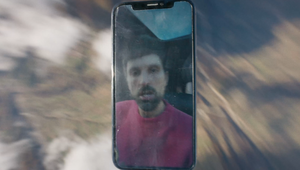
Not Pretentious, But Not Naive: Bafic’s Approach to Filmmaking

Studio RM, the creative studio specialising in colour grading and post production across film, print, and digital, is partnering with Little Black Book to sponsor The Directors channel. It’s a space for celebrating directors who create aesthetically beautiful and nuanced imagery, the creative potential of technology, and diving into the trends in contemporary culture which these visionary minds so often spark.
In this series, we’ll be highlighting directors who have a distinctive creative voice, and who are championing new and exciting visual styles through fashion, music, and culture. Today, we’re speaking to Bafic, a director whose approach to his craft we are immensely excited to learn more about.
Repped by Love Song, Bafic counts Daniel Wolfe as one of his closest mentors. His Skate Nation Ghana film for Facebook was a standout LBB favourite of recent years and he was also involved in the incredibly successful Channel 4 idents relaunch earlier this year.
LBB’s Addison Capper chatted with Bafic about the joys of ‘offsetting’ on set, colour grade as the “smell of the film”, and he’s so keen to get a message about the future to the VFX industry.
LBB> In your bio, it says that your work is “unpretentious, but not naive,” which is a line that I really enjoyed. Can you elaborate on how you feel that works in practice, and how it influences the way you approach a production?
Bafic> Me and my friends always talk about this idea of high-key/low-key, and my favourite word is offset. It’s the best rap name. It is my favourite word, offset. On any given project or any given day, I’m constantly saying, “We need to offset this,” so I think ‘not pretentious, but not naive’ is baked in loads of stuff that I’ve spent reading about philosophy or nature, or just random things that I’ve spent time reading, but presented in a palatable, easy way and not chin stroke-y. I’m obsessed with the idea of gateway drugs and being a gateway drug. I want to be someone’s entry into harder information and denser things. Unpretentious, but not naive, it just means it’s aware of things.
I was with my friends the other day, and they asked, “What would you define as smart?” I define someone smart as someone who says they don’t know, and I define someone dumb as someone who says they do know when they don’t. So then I meet people who know a lot, and I ask them questions.
LBB> What were your influences growing up and how did they help shape your creative voice?
Bafic> Rap music and the Bible, ironically, because I grew up in church.
Rap music taught me the power of a good metaphor, the power of a good double entendre or a triple entendre, and also high-key/low-key. Like, rap music taught me how to present things as palatable, but underneath it, it’s got so much density. There’s this book from Jay-Z called Decoded, which is him breaking down his songs and then lyric by lyric: the main body, the meaning behind the lyrics, the cultural context in which the song was written, and the political context. And that same analysis exists for Picasso’s ‘Guernica’. Nothing is born out of nothing. Everything is connected.
And in church, I heard stories all the time [from the Bible], and then retold and then analysed on stage, and not just analysed, but then retold in reference to modern times, from the pastor’s personal experience. And then, as I got a bit older, rap music and church - just hearing those things back to back - totally different, but the same thing, which is just storytelling.
LBB> The style of a film changes brief by brief, but how would you underpin your general visual style? Are there certain factors that you could pinpoint as a signature for you?
Bafic> I am scared of style. I don’t like the idea of having a definitive thing because I see how it can become a prison. It's like how rap music is always changing. Especially with sampling being so important in rap music, sampling other genres as well as contemporary music and historical stuff, it’s always changing its style and patina and form. It makes it harder to pin down. You can’t pin it down to a style, cadence, or flow. Hip-hop is like an ever-evolving Pokémon that just swallows things whole and becomes a new form. And with rap, anything that you might think is a hindrance or might crush it, just swallows it whole and makes it a part of it. Rap is constantly changing and evolving and never stagnant. Maybe it’s because it’s born out of a place of lack, so you must be transforming and trying to be on the edge constantly.
So, with my visual style, I think of it as something other than a patina. It’s a vessel, so it depends. Style can also be how you do things. My visual style is to be constantly evolving.
LBB> Your ‘Skate Nation Ghana’ film is one of my absolute favourite branded spots from recent years. Could you tell us a bit about the process of making it? There’s so much going on in those two short minutes!
Bafic> There were a lot of conversations going back and forth amongst the creative team and a lot of interrogating and joking and laughing and stories. We kept thinking about how to push it in a way that we haven’t yet, which is what drove the project. I’m obsessed with this thing Elon Musk tweeted in 2017, where he said, “A ceiling is simply a floor from below.” I think about that so much. Like, you push and push to exist, and it’s just the floor for someone else. It’s just a stepping stone for someone to stand on top of, and that’s incredible. So it’s essential to push it as much as you can because then someone else will stand on top of it, and I find that so interesting.
There’s a section of working where, in post, I push things more, and I usually do those finishing things while editing. That’s the beauty of collaboration, as much as you can, like working with others. I’ve learned so much from Daniel [Wolfe] and sharing edits with him and my peers and friends, which pushes it even further.
LBB> Which other projects of yours have felt particularly important, and why?
Bafic> The next one! I feel like we’re chasing ourselves. It seems like you’re pursuing all this stuff out there. You’re just trying to find out more. When I go to the cinema, I find I’m just looking for myself in a film – stuff I’m going through. I’m just looking for answers to stuff happening in my life in music lyrics or paintings, too. It’s funny, the process of making stuff is also getting to the promised land to realise this idea, and in the process, you find out so much about yourself, and what you find out becomes a floor for you to stand on top of and what you’re grasping at becomes another thing for you to get a hold of and expand your horizons.
But from what’s already happened, I’m really proud of ‘Sub Eleven Seconds’. I get messages from people about it. I find it so mythical what we do. I’m so allured by it. We did a cut, and there was one moment when me and Harry [Yoon], the editor, just had tears in our eyes. It was just a lot. I’m so interested to see how it ages. I actually said to Sha’Carri [Richardson]: I’m not so sure you’re going to like it now, but what matters is that you watch it in 10 years, 15 years, 20 years, no matter what you decide to do with your career - if you choose to quit become a teacher or become a monk, or whatever you want to do, or you become like, the greatest of all time - I want you to look back at this [film] and be like, “That was me at that moment.”
LBB> How do you use things like colour and grade to accentuate your vision?
Bafic> I think of grade as a patina. Colour grade is dangerous because it’s the perfume of the film, and a lot can be felt by the smell of an environment, and the same with grade. I try to use it like, ‘How can it enhance the spirit or philosophy of something?’ So, if it’s cold, I can make it feel more sterile and lean into the systems and politics, whereas if it’s warm or a bit more emotional. But then, sometimes, I like to do the opposite just to bait and switch a feeling and add surprise. But, the colour grade is so important. I tend to try and think of it early on with the overall colour of an image, and production, costumes, lighting, and stuff like that. It’s a hard thing to touch as well because it just sits on the surface. Like, when you walk into a room or walk past someone, and you get a whiff of a smell, and you suddenly get transported back to a holiday when you’re nine or 10 - grade does that. I don’t know, it’s a really interesting thing.
LBB> How important is the role of colour/grade in the overall look and feel of a film?
Bafic> As mentioned above, super important. Grade is really deep. Everything from shooting in like the Middle East and you make it yellow - that’s really interesting and political. You might not even know why you do it. You go from that to very washed colours or being vibrant. Grade is really like a signifier of the time something was made.
A second layer of that is the whole conversation on film and digital. It’s really about the emotional and mental cues that trigger in your mind’s eye. It’s a similar thing. The viewer might not be able to articulate it, but it goes into the feeling, into this smell of the project.
LBB> For you, what is the most important working relationship for a director to have with another person in making a commercial? And why?
Bafic> Everyone! Everyone, and runners.
The best thing about being a director is talking to so many different people. I noticed that I do this, and I do it in life as well, but I always cross reference. I’m always like, “How’s it going with XYZ? Has it been good? Please let me know - if there’s anything, let me know.” Sometimes, it’s hard to zoom out because you’re so in it. As directors, we need to put out fires before they even show themselves as smoke, so your relationship with everyone on that set matters. It’s like you’re spinning plates while standing on a ball on a tightrope, and one of the plates is the chessboard, and you’re playing chess with the grandmaster. That is what it’s like, that’s what it is! It’s so good and intense and amazing. I don’t know what a better feeling is than seeing everything come together and being surprised. It’s just magical.
LBB> Are there any new technologies or techniques exciting you in filmmaking right now?
Bafic> I want to shout this into a megaphone for everyone in VFX: shit is changing. It’s changing. And you can decide if you will be behind or in front of it. But, over the hill is a whole different world! The sunset over there? How it came to be is different, maybe it wasn’t rendered, maybe it was made using a dataset of millions of other sunsets, but that sunset over that hill is so refined. Especially in a commercial context, it’s going to change. It’s coming. And just to put it into context, right now is the worst it’s ever going to be in terms of VFX and AI technology. VFX has always needed to be on the edge. It’s always needed to do that. It’s Moore’s law in an art form. It needs compounding innovation because it’s trying to catch up with the minds of artists and creators who want things that don’t exist yet. And it’s just getting faster and faster. And it will change a lot, whether that’s like ads for gaming, or content for gaming outside of games, whether that’s storytelling things. In short, I’m super fascinated with AI and the talent that will come out of it. It’s just like I said about ‘Guernica’ - nothing is born out of nothing, and the context that it was born out of is changing, and the talent that’s going to come out of it and try to go to existing companies and get the door shut on them and then set up their own and then swallow those companies. These times are changing….














